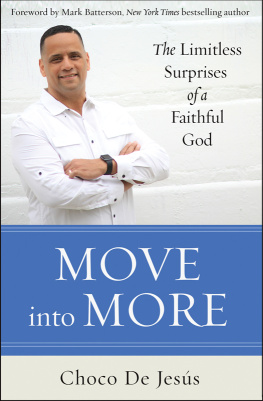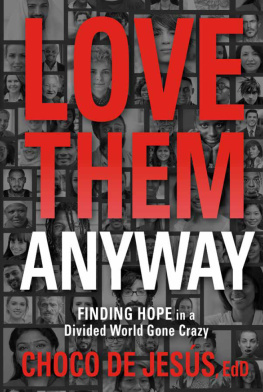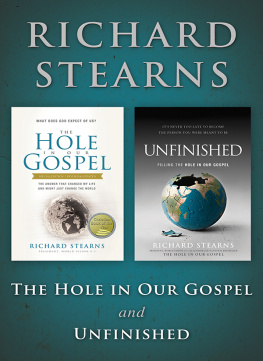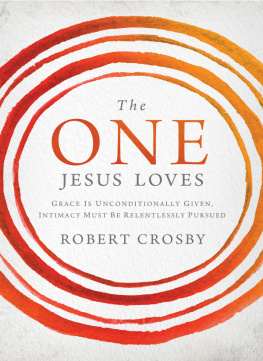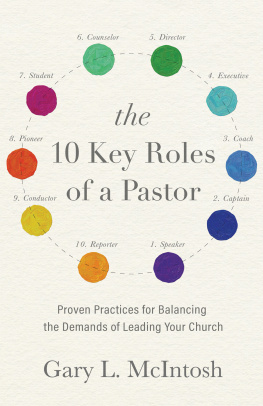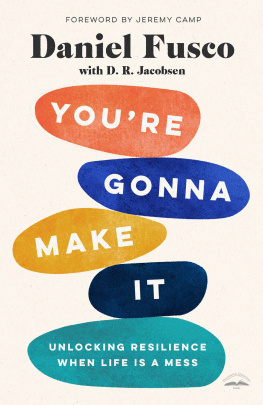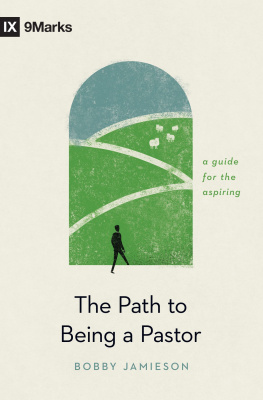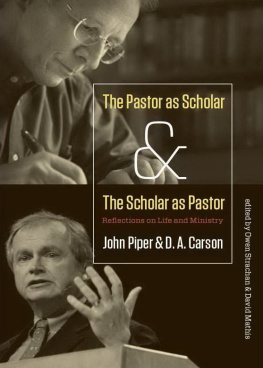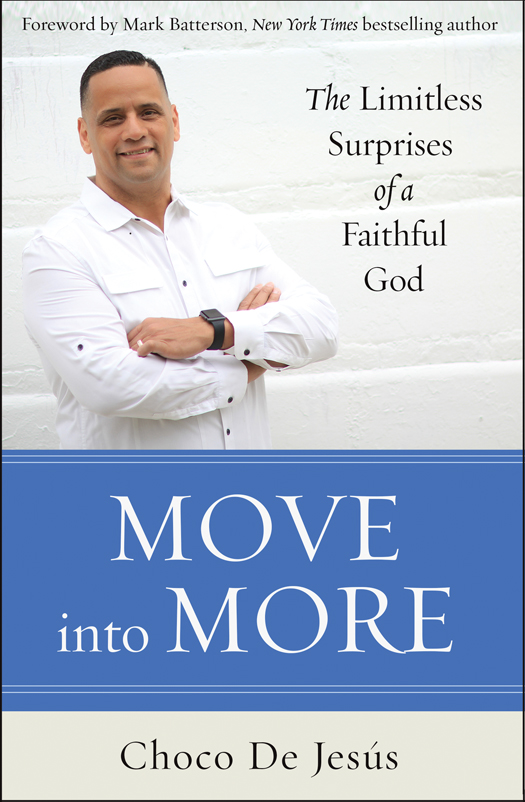CONTENTS
Guide
Information about External Hyperlinks in this eBook
Please note that footnotes in this ebook may contain hyperlinks to external websites as part of bibliographic citations. These hyperlinks have not been activated by the publisher, who cannot verify the accuracy of these links beyond the date of publication.
Pastor Choco leads by example. In Move into More, he shares powerful personal testimonies of how living in the fullness of Christ has changed his life, changed his church and the life of those around him. This book helps others to experience this same rich, abundant life.
Roma Downey, actor and producer, president of LightWorkers Media
Pastor Choco has a heart for the lost, for those who are hurting, and for the downtrodden. Move into More reminds us that serving others should be a priority of all Christ followers. We receive blessings from God when we pour blessings into the lives of others.
Kirk Cameron, actor and producer
Move into More is for anyone who wants insight on Gods blessings. Using biblical principles and examples, Pastor Choco helps readers understand the importance of not only receiving but freely sharing Gods blessings.
Ed Stetzer, Billy Graham Distinguished Chair, Wheaton College
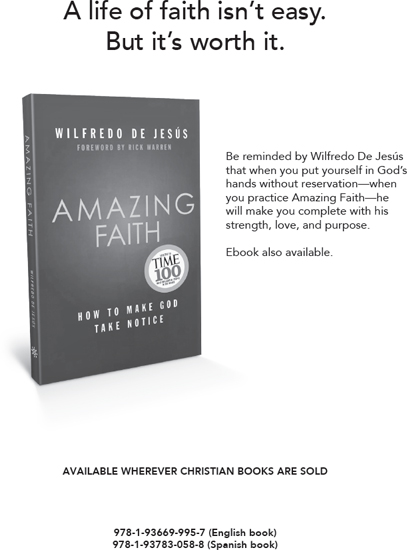
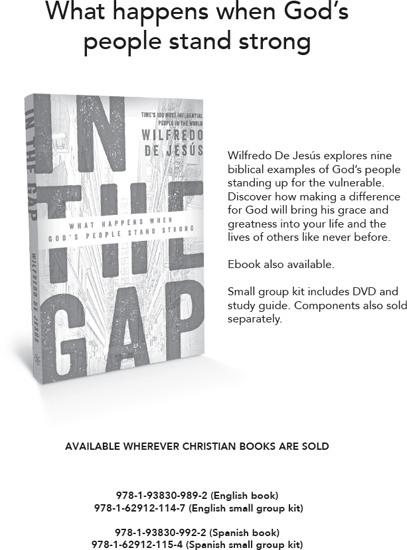
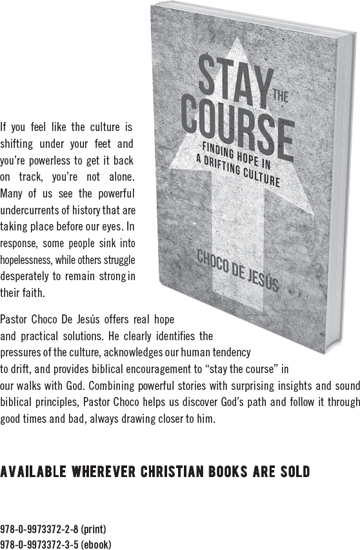
ENDNOTES
. Kyle Chayka, The Oppressive Gospel of Minimalism, New York Times Magazine, July 26, 2016, http://www.nytimes.com/2016/07/31/magazine/the-oppressive-gospel-of-minimalism.html.
. Beverly D. Flaxington, The Epidemic of Insecurity, Psychology Today, April 7, 2015, https://www.psychologytoday.com/blog/understand-other-people/201504/the-epidemic-insecurity.
God loves each of us as if there were only one of us.
AUGUSTINE
N o one is more surprised than me to see where I am right now.
I remember my mother sending me to the corner store when I was a kid, probably around eleven or twelve years old. While I was willing to go and wanted to help out, I absolutely hated going. We had little money, so she often gave me food stamps to use for the items on her list. Stuffed deep in my pocket, those little coupons made me feel so ashamed. I felt like I carried a dark secret. I wasnt ashamed to be poorthat was just the way life was, for us and so many others. I was ashamed because using those food stamps felt like giving up, relying on the government, resigning myself to being a victim of circumstances.
So whenever my mother sent me shopping with those pink, green, and blue slips that reminded me of Monopoly money, I acted like a spy on a secret mission. We lived in Humboldt Park, on the northwest side of Chicago, and while I wouldnt want to be on certain streets after dark, going to the store in broad daylight was relatively safe. Id casually walk the couple of blocks from our apartment, but as soon as I turned the corner and spotted the store, Id duck into the nearby alley. Id watch the entrance of Sams store to see how many people were coming and going, and more importantly, if I recognized any of them. Once the coast was clear, Id make a run for it, dashing through the door as the bell above it rang.
Hola, Chocolate, Sam would say, looking up from ringing up a customers purchase. The place smelled of tobacco and overripe fruit; it had high shelves and no windows except the ones by the door. Id return his greeting and head down the produce aisle to scope out the place. Over the bins of potatoes and onions, Id scan the faces of shoppers for anyone who might know me. If I saw kids I knew from school or the neighborhood, Id rush to the candy aisle, buy a two-cent piece of bubble gum, and leave, before starting my surveillance all over again. If it wasnt too busy and I didnt know anyone, then Id begin finding the items on Mamis list.
Then, finally, the moment I dreaded the most: bringing out those crumpled coupons to pay for the food. If possible, I would wait until no one else was in linenot always easy on a Saturday afternoonand then rush through the transaction as quickly as possible, worried a friend or neighbor might come in and see me with food stamps in hand. Sam could tell I was embarrassed and always spoke kindly to me, a certain familiar sadness in his eyes.
Even before I became a Christian and God set my life on a completely unexpected path, I knew I wasnt willing to settle for the kind of life I had been born into. I tried not to judge others, but the prospect of dropping out of school, living on food stamps, and juggling dead-end jobs made me determined to get out.
Even as a kid, I knew I wanted more.
Status Check
A few years ago, I was feeling a little out of my element, and a renowned educator and speaker was kind enough to help me prepare for an important speaking engagement. As I shared my story with him, this professional was surprised to hear how my life had unfolded and catapulted me into full-time ministry. He told me I was a status inconsistency. Thats the term sociologists use for someone whose ascribed statusin my case, a Puerto Rican male born into a large, single-parent family in inner-city Chicagodoesnt match their achieved statusa pastor of a thriving church, a husband for more than twenty-five years, a father of three and grandfather of one, a speaker and educator, a graduate student currently completing a doctorate.
I hadnt ended up as a high school dropout, gang member, day laborer, or felon, which, unfortunately, is how many with my ascribed status wind up. Based on statistics, I should not have escaped the socioeconomic and cultural barriers inhibiting so many people born into similar situations. But by the grace of God, I never followed the stereotypical script for my demographic. I became more than any sociologist ever could have predicted.
I became more than I ever dreamed because I discovered the exhilarating, limitless, unpredictable, overflowing life of Gods more. And Im not the only one with privileged access to his abundance. Once we accept Jesus into our hearts, we all become status inconsistencies.
Were no longer who we once were, no longer on the trajectory for a life like others with similar situations and characteristics. Paul described this dramatic change in a letter to the church at Corinth, listing those who will not inherit the kingdom of Godincluding idolaters, adulterers, liars, swindlers, and the sexually immoralbefore revealing that is what some of you were. But you were washed, you were sanctified, you were justified in the name of the Lord Jesus Christ and by the Spirit of our God (1 Cor. 6:11). No matter how we grew up, what weve done or havent done, or who weve been or havent been, God meets us where we are. But he loves us too much to leave us there. Once we invite him into our lives, were no longer living a life by default, feeling like a victim of circumstances. We become his new creation with the adventure of our lives ahead of us.
No matter how we grew up, what weve done or havent done, or who weve been or havent been, God meets us where we are.
We begin becoming all of who God created us to be.
Hearing and Believing

